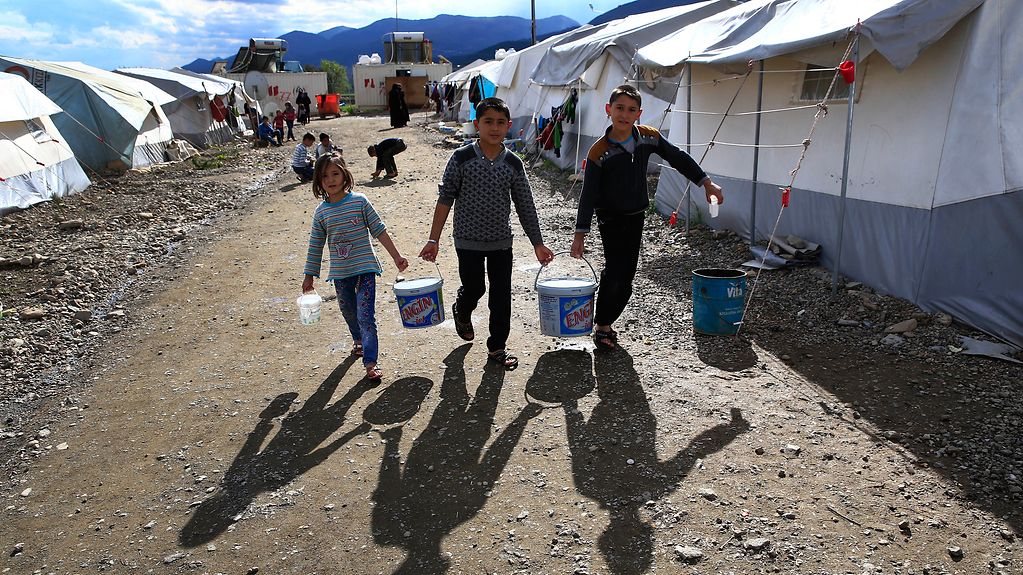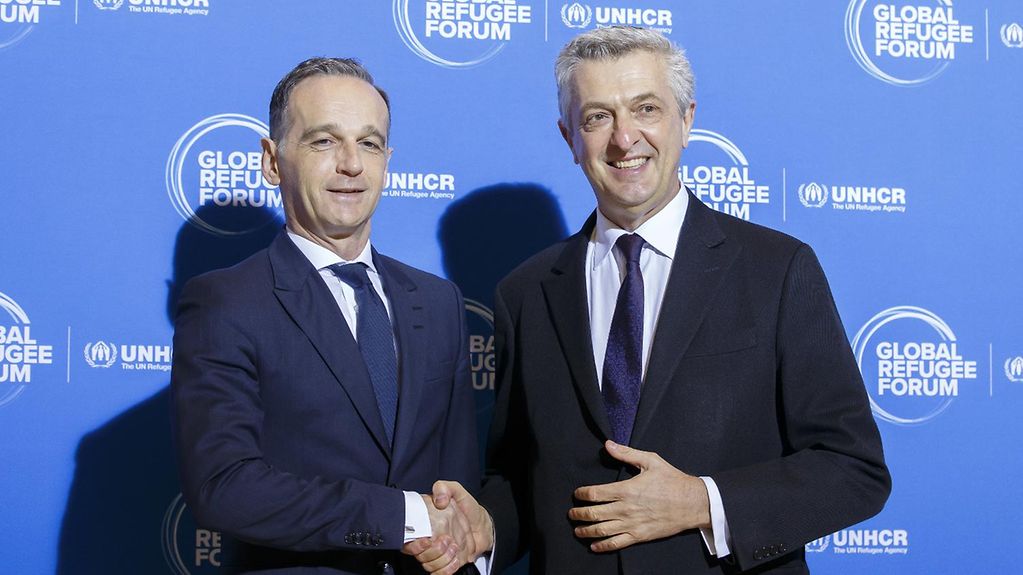Global Refugee Forum
At the Global Refugee Forum in Geneva, Germany is advocating that as many states as possible assume responsibility: “We want greater international cooperation in dealing with refugees,” said Federal Foreign Minister Maas.
4 min reading time

Refugees from Syria in a camp in south-eastern Turkey. There are more than 71 million refugees worldwide.
Photo: picture alliance/AP Photo/Lefteris Pitarakis
A year after the signing of the Global Compact on Refugees, it is important that as many states as possible demonstrate their solidarity and assume responsibility. “We need to spread the burden across more and broader shoulders. And we need to offer refugees opportunities for a self-determined life. A life in dignity,” explained Federal Foreign Minister Heiko Maas as the Federal Government’s representative at the Global Refugee Forum.
Germany will continue to assist with both, he said, in its dual role as second biggest donor to the United Nations Refugee Agency (UNHCR) and fifth biggest host country for refugees. This is because “issues concerning refugees can only be resolved together, multilaterally”, according to Maas.
Taking initial stock of the Global Compact on Refugees
Representatives of all United Nations member states and non-governmental organisations (NGOs) meet at the Global Refugee Forum. Together with representatives of associations, companies and refugees, the aim is to take initial stock of the situation one year after the signing of the Global Compact on Refugees.
Alongside this appraisal, the forum will be used primarily to announce concrete commitments and highlight steps by which participants can contribute to implementing the objectives of the Compact on a voluntary basis.
Participating member states and interested parties will meet at the Global Refugee Forum, organised by the UNHCR, in Geneva from 16 to 18 December. This year, Germany is co-hosting the forum, which will be held every four years in future.

Federal Foreign Minister Maas (left) with UN High Commissioner Filippo Grandi: Germany meets the main requirements of the Global Compact on Refugees.
Photo: picture alliance/KEYSTONE
Focus on education
This year's forum will focus on: a fairer spreading of the burden and responsibility in connection with global refugee phenomena, issues of energy, infrastructure and education as well as concrete solutions to refugee situations, especially in relation to employment, livelihoods and better protection capabilities for refugees.
Germany is a co-sponsor in the field of education and is advocating, in particular, scholarship programmes. On this, Federal Foreign Minister Maas explained: “Next year we will provide over 13 million euros for an initiative named after one of the most famous German refugees: Albert Einstein. This year alone it has awarded 8,200 scholarships to refugees in 54 countries.”
The Albert Einstein German Academic Refugee Initiative (DAFI) Programme, the university scholarship programme set up by Germany, advocates better access to higher education for refugees. It is run by the United Nations Refugee Agency (UNHCR) and enables young refugees to study at academic institutions in their host country.
Up to now, the Albert Einstein German Academic Refugee Initiative (DAFI) Programme has been financed solely by the Federal Government. “I am delighted that we have found a new partner in Denmark so that now, together with the UNHCR, we can put this programme on a multilateral footing,” said Maas.
Financial commitments
In view of the current refugee situation involving more than 71 million refugees worldwide, Maas stressed: “This year we have more than doubled our voluntary contribution to the work carried out by the UNHCR.”
He announced that Germany will support the UNHCR to a similar level in 2020, too, and promised a first instalment of 124 million euros. In addition, through the Philipp Schwartz Initiative of the Alexander von Humboldt Foundation among other programmes, the Federal Government will provide funding of more than ten million euros to support persecuted academics. Maas also announced development policy measures to offer more effective support for refugees in host countries and countries of origin and to minimise the causes of refugee situations.
In addition to the continuation of the employment initiative in the Near East, the Federal Government will increase its funds and provide a further 16 million euros for “Education Cannot Wait”, the multilateral education fund of the Federal Ministry for Economic Cooperation and Development (BMZ). The fund facilitates school education for nearly two million children and young people in 18 crisis-stricken countries. The Federal Government is also advocating strengthening the role of women in peace processes. For this reason, the BMZ is establishing a campaign network for women refugees.
The Global Compact on Refugees
On 17 December 2018 the international community agreed with a large majority to the “Global Compact on Refugees”. It is the first comprehensive framework for issues relating to refugees and supplements the Geneva Refugee Convention, which has been in force since 1951 and to which Germany is still committed. The Compact aims to improve international cooperation and achieve a fairer spreading of the burden. It is not legally binding, rather it is a declaration of political intent and undertaking. Each member state decides itself how it will apply individual measures or initiatives politically.
Germany's contribution
Germany already meets the main requirements of the GCR (Global Compact on Refugees), in many areas to a higher level than prescribed. The Compact is therefore an important reference point from which to remind other states of their obligations. The funding of measures for the Global Compact on Refugees is voluntary. The Federal Government does not incur any compulsory costs arising from the Compact.